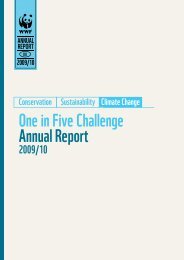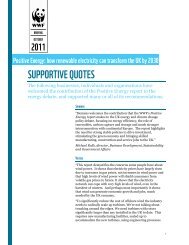Positive Energy: how renewable electricity can transform ... - WWF UK
Positive Energy: how renewable electricity can transform ... - WWF UK
Positive Energy: how renewable electricity can transform ... - WWF UK
You also want an ePaper? Increase the reach of your titles
YUMPU automatically turns print PDFs into web optimized ePapers that Google loves.
10 POLICY<br />
RECOMMENDATIONS FOR<br />
THE <strong>UK</strong> POWER SECTOR<br />
This report s<strong>how</strong>s that it is<br />
perfectly achievable to develop a<br />
power sector that is decarbonised,<br />
environmentally sustainable,<br />
affordable and beneficial to the<br />
<strong>UK</strong> by 2030.<br />
To sustainably and affordably decarbonise our power sector we must prioritise <strong>renewable</strong><br />
energy growth, reducing energy demand and increasing interconnection with the rest of<br />
Europe. Making this transition needs bold policies:<br />
• The government should set a target for <strong>renewable</strong>s to provide at least 60%<br />
of the <strong>UK</strong>’s <strong>electricity</strong> demand by 2030: A target will provide a signal to investors<br />
that the <strong>UK</strong> intends to continue to invest in <strong>renewable</strong>s post-2020. A high level of<br />
ambition will make <strong>renewable</strong> energy manufacturers confident that the <strong>UK</strong> intends<br />
to exploit its vast <strong>renewable</strong> resources and is ‘open for business’. The 60% target is<br />
well within what GL GH believes to be technically achievable by 2030. In fact, it is<br />
substantially lower than the levels recommended by industry in other reports 4 .<br />
• The <strong>UK</strong> must adopt ambitious absolute targets for reducing <strong>electricity</strong><br />
demand: The government must recognise the economic and environmental benefits<br />
of reducing demand for <strong>electricity</strong> long-term. Reductions <strong>can</strong> be achieved through<br />
energy efficiency measures and behavioural change in all sectors of the economy.<br />
Benefits include reducing the generation and transmission infrastructure needed to<br />
maintain system security and lower costs for consumers. Policies should promote real<br />
competition between companies which help industry and consumers cut energy use<br />
and those seeking to build new generation capacity. Introducing long-term contracts<br />
to reduce demand could be one way of generating substantial energy efficiency gains<br />
in various sectors of the economy.<br />
• The government should make the take up of energy efficiency measures<br />
happen: There are many financial and technical barriers which stop the domestic<br />
and commercial take up of energy efficiency measures. Removing these will require a<br />
range of measures, such as providing low interest rates to consumers insulating their<br />
homes under the upcoming Green Deal and other financial incentives. In particular,<br />
the government should invest an amount equivalent to a substantial share of the<br />
revenues raised by the Carbon Floor Price (and possible future related windfall taxes)<br />
into energy efficiency support measures.<br />
• The reformed <strong>electricity</strong> market must include well designed, long-term<br />
financial support mechanisms for <strong>renewable</strong> technologies: Appropriate<br />
support for <strong>renewable</strong>s is needed to attract investors to the <strong>UK</strong> and drive costs down.<br />
The government reforms must deliver mechanisms that are designed to last for<br />
the long term, are as simple as possible and are specifically adapted to the needs of<br />
<strong>renewable</strong> technologies.<br />
<strong>WWF</strong>-<strong>UK</strong> 2011 <strong>Positive</strong> <strong>Energy</strong> page 11

















